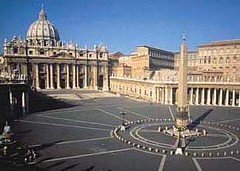Papa Ratzi Post
This blog is a "Chronicle of Pope Benedict XVI." Looks good.
Sunday, April 24, 2005
Saturday, April 23, 2005
Is the Catholic Church a Monolith? . . . YES!

In an effort to defend its many divisions and serious doctrinal contradictions, Protestant Christian apologists often claim that Catholic representations of Protestant doctrinal disunity are exaggerated -- caricatures of what it means to be Protestant. Further, they point the finger at disunity in the Catholic Church, whose laymen and theologians on an uncomfortably large scale disagree on big issues.
Therefore, the Protestant apologist says, since the Catholic Church itself is no doctrinal monolith, then neither can Protestant churches be condemned for their differences, especially since most of them agree on the "essential issues."
But I say unto you, that there is a big difference between Catholic divisions and Protestant divisions.
All the various Protestant churches can and do have their own doctrinal creeds, their official beliefs. Therefore, one church, for example, can officially teach that baptism is necessary for salvation, while the church across the street can teach that it is not necessary for salvation.
The individual Christian, then, is free to join up with either of these churches (or still others) depending on his or her own interpretation of Scripture. As their interpretations evolve, for better or for worse, they may seek to attend a new "fellowship," or even start one of their own.
In the name of "can't we all just get along?", many non-denominational churches widen their acceptable doctrinal boundaries to accomodate as many people as they can. If you want to believe Jesus is God, great. If you want to believe Jesus is a divinely sent created being, that's okay, too, as long as we all believe in Jesus. In this way, by avoiding the responsiblity of defining and defending truth, they seem to encourage doctrinal disharmony. Truth is sacrificed in the name of acceptance.
On the other hand, there is no dispute about what the Catholic Church officially teaches. Now, you can find a complete and faithful summary of her teachings in the recently published Catechism of the Catholic Church. Therefore, if a Catholic layperson or theologian disagrees with the teachings of the Church, then it's his own fidelity that comes into question, not that of the Church.
The Church's teachings are widely known and open to public scrutiny, and she promulgates, defends, and preserves them with tenacity. For two thousand years, her teachings have never changed or compromised, but rather developed and strengthened. Yes, as a teacher of truth, she is a monolith. But unfortunately her members are not always faithful, and there are tares among the wheat, as Jesus explained.
The non-Catholic Christian may be a holy person, sincere in his love of God, but he does not have access to all the sacraments offered by God through the Church, nor does he have the advantage of learning the fullness of the faith as handed down by the apostles. He is forced to do the best he can with the Bible alone, which, perhaps unknown to him, is itself a gift handed down by the Catholic Church. Understandably, he will frequently err in his judgments, oftentimes falling into serious error.
All of this is not to say that Catholics aren't free to hold various theological positions. No, the Church extends this freedom quite liberally, but only in matters that have not already been defined. Catholics can speculate about what a particular scripture might mean; whether all, the majority, or the minority of mankind will ultimately be saved; in what manner God predestines us; or any number of other issues that aren't already defined authoritatively, or as dogma.
It seems the faithful Catholic enjoys what the Protestant apologist desires for himself: freedom to theologize within the boundaries of Christian dogma. The difference is that the Protestant has no way to determine where those boundaries lie.
Friday, April 22, 2005
JIMMY AKIN.ORG: New Pope's Reaction To Ratzinger Fan Club

JIMMY AKIN.ORG: New Pope's Reaction To Ratzinger Fan Club
This is interesting.
I saw it before, but I think the t-shirt is hilarious:
The Cardinal Ratzinger Fan Club. Putting the smackdown on heresy since 1981.(Before his election as pope, Ratzinger was head of the Congregation for the Doctrine of the Faith.)
Purgatory: Effecting Christ's Work on the Cross
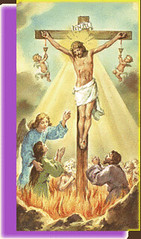
Non-Catholic Christians often raise this objection to the doctrine of purgatory:
It insults the saving power of Christ's work on the cross, because only the cross saves -- not the cross PLUS purgatory or plus anything else.The response is simple:
It is only through the blood of Christ on the cross that a sinner is saved in purgatory.We face all kinds of trials and sufferings today, and these sufferings have a purifying effect on our souls (if we join them with Christ's sufferings).
The Apostle Peter speaks of the faithful who suffer through all kinds of trials, which
. . . have come so that your faith–of greater worth than gold, which perishes even though refined by fire–may be proved genuine and may result in praise, glory and honor when Jesus Christ is revealed. (1 Peter 1:7)Many scriptural passages speak to this idea of suffering as a purifying agent, bringing us to a more perfect union with God. That's not to say our suffering takes the place of Christ's suffering, or somehow insults the efficacy of His saving work, but rather is used by Jesus -- it becomes an extension of His own suffering.
We know that "without holiness no one will see the Lord" (Hebrews 12:14) and that "[N]othing impure will ever enter" the glorified kingdom (Revelation 21:27). Yet most of us will die with some impurity, and without perfect holiness.
Therefore it stands to reason: Just as Christ uses our present sufferings to bring us closer to Him, so Christ can complete our conversion to holiness after we die through purgatorial (purging) sufferings.
Jesus loves us so much that He won't refuse us entrance to heaven even if we die as well-intentioned sinners. He provides a way to clean us up, to purify our souls, so that we, as true sons and daughters, can see God face to face, as it were, and live with Him forever.
Don't confuse Purgatory with a "second chance." It is all part of the first and only. If you die as an enemy of God, then you are "frozen" in that spiritual state for eternity. But if you die in communion with God, even an imperfect one, that communion is locked in as well; it is only the imperfections, stains, and "spiritual dingleberries" that are burned away like chaff, leaving behind a soul that is pure and holy.
We can't know the exact nature of the "sufferings" of purgatory, for the Church doesn't define it. But I would guess that it "hurts good," since we know that all souls who enter purgatory are guaranteed entrance into heaven. Purgatory is God's gift to poor sinners, while hell is God's gift to those who ultimately reject Him.
Whether our conversion to holiness is completed before or after our death, it is singularly Jesus' work on the cross that makes our salvation possible. It is all grace. We just need to accept -- and not reject -- His grace by believing and acting on His Word, trusting in His perfect mercy and perfect justice.
Wednesday, April 20, 2005
Tuesday, April 19, 2005
7 Things to WATCH for After Election of Pope Benedict XVI
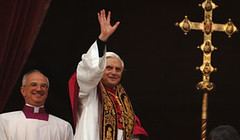
I am delighted that Cardinal Ratzinger was elected the new bishop of Rome today. The new German-born pope has taken the name Pope Benedict XVI.
Here are seven things to WATCH for in these exciting times:
1. Pope Benedict XVI will not allow ordination of women to the priesthood.
2. He will not reverse the discipline of celibacy for priests.
3. He will not "ease up on restrictions" against contraception, nor will he permit homosexual marriages.
4. He will defend the dignity of the human person -- of life.
5. He will not seek a one-world religion since he only believes in Catholicism. Even in a spirit of "let's all get along," he will insist that the Catholic Church alone is the pillar and foundation of the truth.
6. He will come under attack by religious and political liberals for promoting orthodox Christian teaching. Even more than now, the Church will be persecuted by many, but will grow in faith and fervor.
7. The gates of hell will not prevail against the Church. Meanwhile, look for Pope Benedict XVI to write some awesome encyclicals!
Saturday, April 16, 2005
Micro-Catechism
Micro-Catechism
This is a well-written condensed version of the exhaustive Catechism of the Catholic Church. It's available to read at the above link, but it's also offered as an 8-page Word document and 13-page PDF.
Check it out.
This is a well-written condensed version of the exhaustive Catechism of the Catholic Church. It's available to read at the above link, but it's also offered as an 8-page Word document and 13-page PDF.
Check it out.
Friday, April 15, 2005
Why the Title "Holy Father"
The pope is called by the title "Holy Father" not because he is holy in the sense of being sinless or divine, but in the sense of being "set apart."
That's how certain things can be holy, because they are consecrated for spiritual purposes. That's why the ark of the covenant could be "holy," even though it was an object that couldn't make moral decisions. It was set apart for a divine purpose.
While all priests and bishops in the Catholic Church are called "father," appending the word "holy" before it indicates the special Petrine ministry that is executed by the bishop of Rome -- the pope. He is "set apart" from the others just as Peter was singled out among the apostles.
Priests are called "father" because of their fatherly role in forming us in the faith. I explained this further in "Answers to an Ex-Pagan Critic of the Church."
That's how certain things can be holy, because they are consecrated for spiritual purposes. That's why the ark of the covenant could be "holy," even though it was an object that couldn't make moral decisions. It was set apart for a divine purpose.
While all priests and bishops in the Catholic Church are called "father," appending the word "holy" before it indicates the special Petrine ministry that is executed by the bishop of Rome -- the pope. He is "set apart" from the others just as Peter was singled out among the apostles.
Priests are called "father" because of their fatherly role in forming us in the faith. I explained this further in "Answers to an Ex-Pagan Critic of the Church."
Thursday, April 07, 2005
"When They Were Sore"
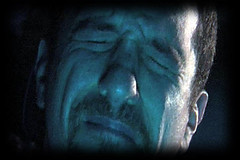
Maybe it's just my warped guy humor, but I can't read Genesis 34:25-26 without grinning (or grimacing):
And unto Hamor and unto Shechem his son hearkened all that went out of the gate of his city; and every male was circumcised, all that went out of the gate of his city.
And it came to pass on the third day, when they were sore, that two of the sons of Jacob, Simeon and Levi, Dinah's brethren, took each man his sword, and came upon the city boldly, and slew all the males.
"Mary Worship" Explained to Church of God Member
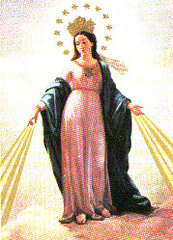
On an Internet forum, I briefly answered an accusation from a Church of God member: "It's just that [Mary] is worshipped by many in the Catholic Church. It stands out as idolatry. What say ye?"
My guess is that you have a different understanding of what "worship" is.
I know full well that not all COGers are the same, but, I heard a COG minister just the other week (online) say that one day all these people in the world will bow down to us in worship during "Tomorrow's World."
When he says worship, he means worship! The idea is that since we will be God Beings one day, we will receive the kind of worship that is due to God alone (or I guess to "God Beings" alone). But that won't happen until we have our glorified bodies, when we are transformed at the Second Coming.
Now consider the Catholic view: According to Catholic teaching, Mary was the exception and even now has her glorified body (unlike the other saints who must wait for the resurrection). She has her full reward already. That's what the teachings of the Assumption and Coronation of Mary explain.
Even though Mary is fully glorified now, the Church teaches:The Church rightly honors "the Blessed Virgin with special devotion. From the most ancient times the Blessed Virgin has been honored with the title of 'Mother of God,' to whose protection the faithful fly in all their dangers and needs.... This very special devotion ... differs essentially from the adoration which is given to the incarnate Word and equally to the Father and the Holy Spirit, and greatly fosters this adoration." (Catechism of the Catholic Church, paragraph 971)So if someone thinks it's okay for one of us created beings to be truly worshiped after our glorification, then he should not be indignant that Catholics give tremendous honor (not worship) to Mary, whom Catholics believe has already received her final reward.
Pope John Paul II: Newspaper Front Pages
Pope John Paul II: Newspaper Front Pages
This is a compilation of world newspapers with JP2's death featured on the front page. You can click any of them to enlarge. Pretty cool.
This is a compilation of world newspapers with JP2's death featured on the front page. You can click any of them to enlarge. Pretty cool.
Wednesday, April 06, 2005
Baptist Legalism?

A young Baptist woman asked if I believed certain ones in my previous church affiliation (a heterodox Christian sect) would be saved.
"Sure," I replied. "They really believe what they're doing is right. I did, too."
"But do you think sincerity is really enough for someone to get into heaven?"
Her last question stirred me to further thought later on.
Her church believes in "once saved, always saved" -- that is, once you've "accepted Christ as personal Lord and Savior," you can never lose out on salvation no matter what you do.
Southern Baptists are very big into "grace" and "mercy." Even if a "truly saved" person dies immediately following a premeditated series of serious sins, then according to them, he will be saved since salvation is an irrevocable gift.
Naturally, "legalism" is the avowed enemy of Baptist thought. It strikes me as odd, then, that a good Baptist would revert to a legalistic approach salvation.
Let me explain.
The Baptist will say that nothing a person can do can qualify him for salvation. That would be legalism. Salvation is a freely given gift of God's love.
The Baptist will say that nothing a person can do can DISqualify him for salvation. That would be legalism. Salvation is a freely given gift of God's love.
But can a young person who died of starvation in a non-evangelized part of a Third-World country be saved? No, says the Baptist, because he did not explicitly, verbally confess Jesus Christ as his Lord and Savior.
Where's the mercy in that? To believe God only bestows His freely given gift of love when one makes a knowledgable, audible confession of Jesus as Lord does not sound like grace, but an awful lot like legalism!
What says the Church? The Catholic believes baptism is necessary for salvation (cf. 1 Peter 3:21). But Catholic theology allows for God's working outside the boxes He created (the sacraments He instituted). Just as the thief on the cross was to be saved without baptism, so can other non-baptized individuals be saved under certain circumstances. There are such things as "baptism of blood" (martyrdom) and "baptism of desire" (invinsible ignorance) that effect the same results as sacramental water baptism.
Catholics are not so "legalistic" as some of its critics suggest, even though they rightly emphasize obedience and fidelity to the Gospel.
It is true that Paul wrote,
That if you confess with your mouth, “Jesus is Lord,” and believe in your heart that God raised him from the dead, you will be saved. (Romans 10:9)But it is also true that Jesus said,
If you want to enter life, obey the commandments. (Matthew 19:17)These are not contradictory statements, or two different paths to God, but two sides of the same salvation coin. What the Holy Spirit has joined together, let no man separate. As far as salvation is concerned, to confess with your mouth is to walk with your feet, and vice versa.
Chapters one and two of Paul's epistle to the Romans explains how salvation may be granted to those who are ignorant, as well as some of those "in the know."
Saturday, April 02, 2005
The Powerful Passing of a Popular Pope
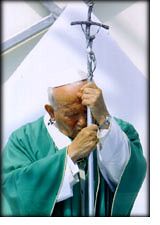
The pope died maybe fifteen minutes ago.
Earlier in the day, reflecting on all the news coverage of his life, I was impressed by how many people held such great admiration and love for Pope John Paul II. There have been numerous moving tributes.
It confirms the fact that everyone deep down believes in truth, in goodness. Even non-Catholics and unbelievers respect and love this man because of what he represented in his actions: the love of God. The Catholic Church is often ridiculed, mocked, and impugned, and has recently been hit hard by scandals, but the Light in John Paul II's life shines through it all.
In contrast, imagine if a widely known drug dealer, prostitute, or porn star died. How would he or she be remembered? Would people say, "She gave joy and happiness to so many men"? "She helped improve the love life of hundreds and thousands of fans"? "He enabled people to take their mind off their troubles"?
No, there would be no such adulation, because deep down we all know their lives were ill spent. We can't help but praise that which is good. This is a testament to the "natural law" that God instilled in each of us.
I am not horribly grieved over the pope's passing. "Precious in the sight of the LORD is the death of his saints" (Psalm 116:15). It is sad, but on the other hand, "to live is Christ and to die is gain" (Philippians 1:21). Our pope is now in God's hands, and he is undoubtedly experiencing unspeakable joy.
We can all be thankful that he showed us how to live, how to suffer, and how to die.
The Catechsim of the Catholic Church speaks on the Christian vision of death:
1012 The Christian vision of death receives privileged expression in the liturgy of the Church:
Lord, for your faithful people life is changed, not ended. When the body of our earthly dwelling lies in death we gain an everlasting dwelling place in heaven.
1013 Death is the end of man's earthly pilgrimage, of the time of grace and mercy which God offers him so as to work out his earthly life in keeping with the divine plan, and to decide his ultimate destiny. When "the single course of our earthly life" is completed, we shall not return to other earthly lives: "It is appointed for men to die once." There is no "reincarnation" after death.
1014 The Church encourages us to prepare ourselves for the hour of our death. In the ancient litany of the saints, for instance, she has us pray: "From a sudden and unforeseen death, deliver us, O Lord"; to ask the Mother of God to intercede for us "at the hour of our death" in the Hail Mary; and to entrust ourselves to St. Joseph, the patron of a happy death.
Every action of yours, every thought, should be those of one who expects to die before the day is out. Death would have no great terrors for you if you had a quiet conscience .... Then why not keep clear of sin instead of running away from death? If you aren't fit to face death today, it's very unlikely you will be tomorrow ....
Praised are you, my Lord, for our sister bodily Death,
from whom no living man can escape.
Woe on those who will die in mortal sin!
Blessed are they who will be found
in your most holy will,
for the second death will not harm them.
Friday, April 01, 2005
FOXNews.com - U.S. & World - Pope John Paul II in 'Very Serious' Condition
Looks like the pope is facing the end.
Those who are fixated on seeing people die a "dignified" death (e.g., starvation of an innocent woman) should fix their eyes on the pope.
His will be a death of dignity.
FOXNews.com - U.S. & World - Pope John Paul II in 'Very Serious' Condition
Those who are fixated on seeing people die a "dignified" death (e.g., starvation of an innocent woman) should fix their eyes on the pope.
His will be a death of dignity.
FOXNews.com - U.S. & World - Pope John Paul II in 'Very Serious' Condition
Schiavo "Allowed to Die"
A photo caption on ABCNews.com reads:
That Terri was "15 years in a vegetative state" is contested by many in the medical community. But that apparently doesn't matter to ABC News.
And the national debate was not over whether she should be "kept alive" or "allowed to die." It was whether she should continue to live or face starvation.
Terri was always "allowed to die." I'm allowed to die, too. We shouldn't fear losing this "right," because none of us will miss out. But when a society imposes starvation on another, that's not letting nature take its course. That's not being "allowed to die." It's being forced to die. And that is "murder."
I'll never see how eating is to be "kept alive," but starvation is to be "allowed to die."
God bless Terri Schiavo's soul, and may He stir all of ours to repentance.
Terri Schiavo died March 31, 2005, after 15 years in a vegetative state. She became the center of a national debate over whether she should be kept alive or allowed to die.Isn't this a classic example of "liberal media bias"?
That Terri was "15 years in a vegetative state" is contested by many in the medical community. But that apparently doesn't matter to ABC News.
And the national debate was not over whether she should be "kept alive" or "allowed to die." It was whether she should continue to live or face starvation.
Terri was always "allowed to die." I'm allowed to die, too. We shouldn't fear losing this "right," because none of us will miss out. But when a society imposes starvation on another, that's not letting nature take its course. That's not being "allowed to die." It's being forced to die. And that is "murder."
I'll never see how eating is to be "kept alive," but starvation is to be "allowed to die."
God bless Terri Schiavo's soul, and may He stir all of ours to repentance.
Subscribe to:
Posts (Atom)

